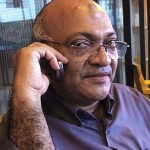Posts Tagged ‘Charlie Hebdo’
The Western freedom of expression hypocrisy
By Johan Galtung
Society is tri-partite: State, Capital, and People with their associations, the Civil Society. There is hard-won and applaudable freedom of expression for People, directed at the State and its feudal predecessors, Clergy and Aristocracy. But how about Capital?
Consider this. Somebody can pay for access to the media – papers, radio, TV – with total freedom of expression of strong views, filling pages and hours of reading space and listening-viewing time; one way. Uncontradicted, nobody writing or voicing contrary views, sowing doubts, coming up with data to the contrary, values, theories against. One-way flow of expression, and not merely a flow of bla-bla words but to induce behavior, even changing behavior; aimed at getting inside readers-listeners-viewers, capturing their spirit to issue new commands to their bodies. Could a tyrant dictator ask for more? Read the rest of this entry »
“Je ne suis pas Charlie.”
By Chaiwat Satha-Anand*
The Paris march for unity on Sunday, January 11, 2015 attracted more than a million people and world leaders including Germany’s Merkel, Britain’s Cameron, Turkey’s Davutoglu, Israel’s Netanyahu, and Palestine’s Abbas, among others. This extraordinary action by leaders and citizens is in response to perhaps the bloodiest week in the last half of a century in France with 17 dead.
It began with the killing of 12 people at a previously little known satirical magazine “Charlie Hebdo.” French President Francois Hollande warned that the threats facing France is not over even after the three perpetrators were dead.
The threat is real, however, not only because of information gathered by various intelligence agencies, but also because the violence and what has followed indicates a rift in the way Europe, and in fact the world, is moving in the context of fierce contestation of different ethics/values people are willing to die and for some – to kill for.
This article is an attempt to argue that the motto “Je suis Charlie”, while commendable in terms of solidarity with victims of senseless violence, transform the killing into politics of identity with potentials for further deadly conflict in the present context if certain existing signs are properly understood.
Signs
Arguably in response to the killing in Paris, there are reports of Muslims becoming targets of more frequent attacks: women’s veils have been pulled at, pork thrown at mosques Read the rest of this entry »
TFF PressInfo # 300: “We Are All Charlie” – but is that story so simple?
By Jan Oberg
Eleven points as a reflection on the terror in Paris and – not the least – the reactions to it*:
1. What was this an attack on?
Was that attack an attack on freedom of speech as such, on democracy, even on the whole Western culture and lifestyle, as was maintained throughout? Or was it, more limited, a revenge directed at one weekly magazine for what some perceive as blasphemy?
2. Is freedom of expression practised or curtailed for various reasons?
How real is that freedom in the West? Just a couple of days before the Paris massacre PEN in the U.S. published a report – Global Chilling – finding that about 75% of writers report that they are influenced by the NSA listening and abstain from taking up certain subjects or perspectives? Self-censorship, in other words. Finally, most of the political leaders marching in Paris on Sunday January 11 have clamped down on media, such as Turkey and Egypt.
I must admit that I have experienced limitations in the practise of that freedom in my own work with Western media and it is decades ago I draw the conclusion that things like political correctness, ownership, commercial/market considerations and journalists’ need for good relations with power – e.g. to obtain interviews – play a role.
I’ve been on the ground in conflict zones and returned home to see reports so biased to tell very little of what I’ve seen myself. And we’ve recently seen lots of cases from the U.S. academic world where there’s been a clampdown on certain views, pulications, courses and professors – not the least in relation to the Israel-Palestine conflict. Or, you look at the proportions between government fund available for peace research and military research in virtually every Western society; free research is a vital element in the self-understanding of the West. But how much of do we have?
3. Freedom doesn’t mean duty.
Is freedom of expression really 100% irrespective of how much the practise of that freedom is hurtful, offending, humiliating or discriminatory against other peoples, religions and cultures? Even if you can express your opinions freely it is not always what we should do.
I can still abstain from making a remark about somebody’s religious or political beliefs because I see no point in offending that person in regard to something he or she holds dear, even part of the identity. But, sure, I have the right to do so.
Using a right to the maximum isn’t necessarily the wisest or most mature thing to do. I draw the distinction between issues that touch personal identity – e.g. religion, nationality, gende – and other issues. It is neither fun nor wise to make satire on what people are.
One must indeed ask in the – chilling – times we live: What happened to words such as solidarity, respect, empathy and to the values of common humanity? There can be no rights without duties as Mohandas K. Gandhi briliantly expressed it.
4. Are anti-Semitic cartoons OK now?
Why is it so important to some media people and Je Suis Charlie people to accept or practise disdain, blasphemy, ridicule or depict (even naked) Muhamad when we know that Read the rest of this entry »


